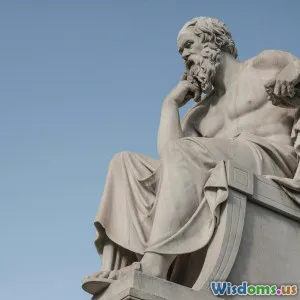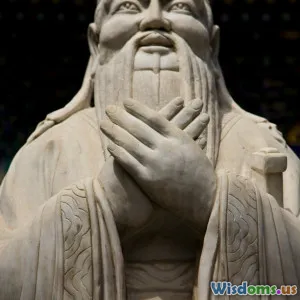
Are the Achievements of Confucius Relevant in the 21st Century
7 min read Exploring Confucius' timeless principles and their vital role in modern society and ethics. (0 Reviews)
Are the Achievements of Confucius Relevant in the 21st Century?
Unlocking ancient wisdom to navigate modern challenges
Introduction
In a world dominated by rapid technological advances, globalization, and shifting ethical norms, one might question the relevance of philosophy formulated over two millennia ago. Confucius, the Chinese philosopher born in 551 BCE, is often associated with principles of morality, social harmony, and governance. But how do Confucius’ achievements and ideas hold up in the 21st century? Is his vision merely a historical footnote, or does it offer actionable guidance that continues to influence societies worldwide?
This article explores the fundamentals of Confucius’ philosophy and investigates its enduring value amid the complexities of today’s social, political, and cultural landscapes.
The Foundations of Confucian Achievements
Confucius’ legacy is encapsulated in a system of thought emphasizing ethics, family loyalty, respect for tradition, and the cultivation of virtue. Central to Confucian teaching are concepts such as Ren (benevolence or humaneness), Li (ritual propriety and social order), and Xiao (filial piety).
The Historical Context and Philosophical Impact
Confucius lived during the Spring and Autumn Period of Chinese history, a time marked by political disorder. His ideas sought to restore stability by advocating moral rectitude among rulers and citizens alike. The "Analects," a compilation of his teachings, has influenced Chinese culture and East Asian societies for centuries.
Unlike other philosophies, Confucianism is less a metaphysical doctrine and more a practical guide to human relationships and governance — ethics that focus on empathy, respect, and duty.
Relevance in the 21st Century: Ethical Leadership and Governance
Contemporary global leadership faces challenges ranging from political polarization to lack of trust in institutions. Confucius’ advocacy for moral leadership remains highly pertinent.
1. Moral Integrity in Leadership
Confucius emphasized that rulers should exemplify virtue, setting a moral example for their subjects. Modern leaders who champion transparency, accountability, and empathy reflect this principle.
For instance, New Zealand Prime Minister Jacinda Ardern's leadership during the COVID-19 pandemic and crises received global recognition for its compassion and responsibility — echoing Confucian ideals.
2. Social Harmony Through Ethical Conduct
Confucius believed that societal harmony arises when individuals adhere to their roles with respect and propriety (Li). In diverse modern societies, fostering mutual respect is crucial amid cultural and ideological diversity.
Programs globally that teach emotional intelligence and respect in schools align with these Confucian concepts, supporting peaceful coexistence.
Family and Community: The Pillars of Social Stability
In the face of rising individualism and technological distractions, Confucius’ emphasis on family bonds (Xiao) and community interconnectedness offers a pathway toward social cohesion.
1. Filial Piety and Intergenerational Respect
While modern lifestyles challenge traditional family structures, the importance of honoring and caring for elders remains a universal concern. For example, East Asian societies continue to uphold Confucian respect for elders, which manifests in policies encouraging intergenerational support.
2. Community Responsibility in a Globalized World
Global crises like climate change and pandemics heighten the need for collective responsibility, which resonates with Confucius’ ideas on social duty. Grassroots community organizations inspired by shared responsibilities exhibit Confucian virtues indirectly.
Education and Cultivation of Virtue
Confucius was an advocate for education as a tool to cultivate virtue rather than merely accumulate knowledge.
1. Lifelong Learning and Moral Development
His belief that anyone could become a Junzi ("noble person") through diligent learning and self-improvement is empowering. This outlook nurtures growth mindsets vital in today’s knowledge economy.
2. Modern Pedagogical Applications
Contemporary education systems integrating character education and ethical reasoning echo Confucian priorities. Singapore’s education framework, deeply inspired by Confucian values, aims to produce "citizens of good character," demonstrating tangible impact.
Navigating Modern Challenges: Technology and Confucian Ethics
The 21st century presents technological quandaries—AI ethics, privacy, digital conduct—that Confucian principles can illuminate.
1. Human-Centered Ethics in AI Development
Confucian focus on Ren or empathy underscores human welfare above mere efficiency. For example, AI ethics frameworks advocating for fairness and empathy parallel Confucian compassion.
2. Digital Etiquette and Reciprocity
Social media can exacerbate conflicts and disrespect. Confucian stress on respectful communication and reciprocity offers a blueprint to foster civility online, a pressing need in today’s polarized digital landscape.
Conclusion: Timeless Wisdom for Contemporary Society
The achievements of Confucius extend far beyond mere historical influence — his principles offer a deep wellspring of wisdom highly relevant to the complexity of modern life.
From ethical leadership and social harmony to the nurturing of family values and education, Confucius’ teachings inform approaches to today’s moral, social, and technological challenges. His focus on empathy, ethical obligations, and continuous self-cultivation provides a framework that transcends time and geography.
Embracing Confucian values can inspire individuals and societies to rebuild trust, promote respect, and foster a more compassionate and stable world. Thus, Confucius remains not only a great figure of history but a guiding compass for the 21st century and beyond.
“The journey with a thousand miles begins beneath one's feet.” — Confucius
Rate the Post
User Reviews
Popular Posts
















